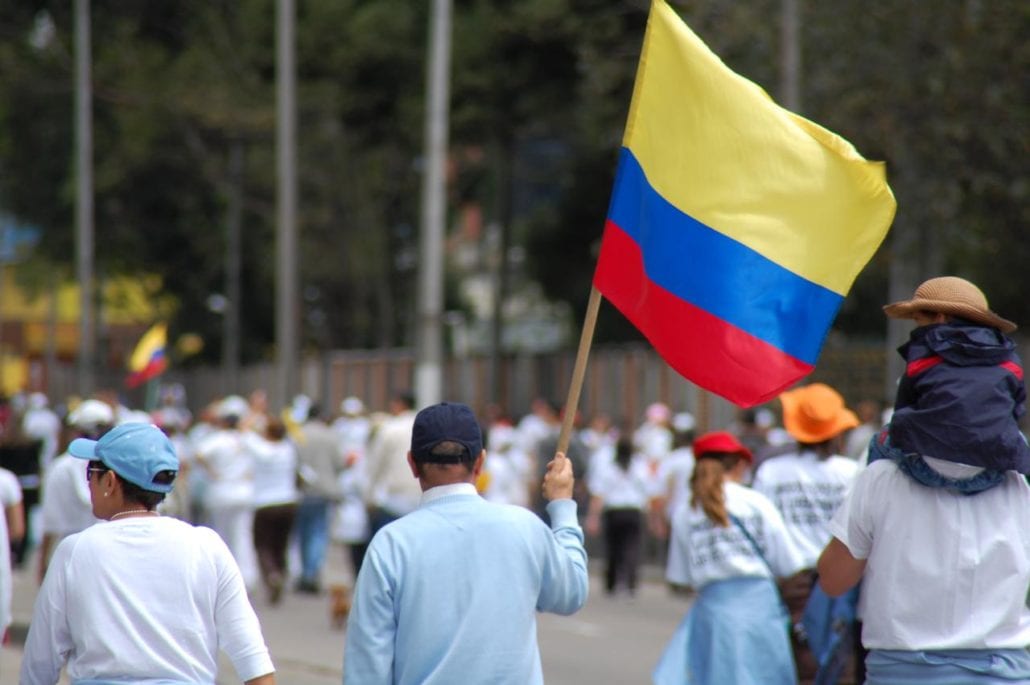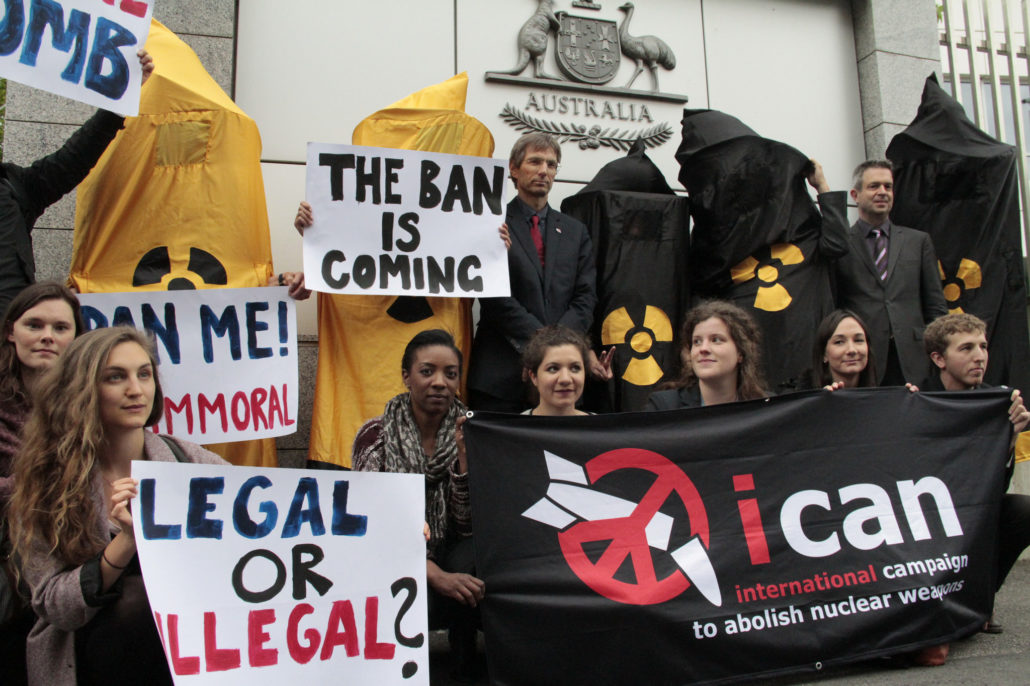The Evolving Incarnation
BY JAMES HUG, S.J. | December 22, 2017
“Be Watchful! Be Alert! You do not know when the time will come!” [Mk. 13:33]
This opening line from the gospel for the 1st Sunday of Advent seems in no way unusual. We hear a similar message each year at this time. But this year it may be providing the context for a new sense of the season—and an invitation to take part in the incarnation of God’s Spirit in a world so terribly in need of it.
In early October, Fr. Bruno Cadoré, Master General of the Dominican Order, wrote to the members of the Dominican family—priests and brothers, nuns and sisters, lay associates—with a special request. Following upon last year’s 800th Jubilee of the Order, he asked all members of the Dominican family to join in a new, annual work of solidarity for peace. He proposed that, during the period from the 1st Sunday of Advent to January 1st, the Church’s World Day of Peace each year, the Dominican family pray in solidarity for peace and together offer solidarity for a particular project for peace.
He identified that focus of solidarity for 2017 as Colombia, where Dominican brothers and sisters have long been working for peace. Just a year ago, November 30, 2016, a peace treaty between the major combatants was signed in what was effectively a civil war of over 50 years. Rebuilding the nation and the peace after so much trauma and destruction is deeply challenging and is at an early and fragile stage.

Photo: Alejandro Cortés via Flickr
Materials on peacemaking projects currently underway there accompanied the letter and reminded me that the peace that is the focus of the solidarity of prayer and action cannot be visualized in the depictions of peace that will be flooding the mails on Christmas cards—the lovely moonlit winter landscapes suggesting the soft strains of “Silent Night.”
The prayerful solidarity being asked for by Fr. Cadoré is the demanding and dangerous work of peace-building, peacemaking. I am reminded of my one visit to Colombia more than 25 years ago where I was shown the office at a Jesuit Center for Research and Popular Education [CINEP] that was documenting human rights abuses in the war zones. The staff members went out daily, at the risk of their lives, to make sure an honest record was kept of the atrocities so that reliable foundations for reconciliation and peace-building would be available when the time might come. The Jesuit Director of that Center, Fr. Pacho DeRoux, S.J., was trying to play a negotiating role among the combatants, a role whose extreme dangers had been made clear in the martyrdom of 6 Jesuits and their 2 colleagues just 2 years earlier in El Salvador.
Prayer and solidarity for peace in Colombia, even now, is prayer and solidarity for essential, painfully difficult, and life-threatening work for social healing.
It is striking to me that this invitation to focused and prayerful solidarity comes as we are challenged by the scriptures of Advent with the charge: “Be watchful! Be alert! You do not know when the time will come.” What are we to be watchful for? To be alert to? Is “the time” coming now?
As I reflect on our context, it is becoming clear to me that a time has come in which something new, something global is in the process of being birthed.
Consider the momentum.
- Just 20 years ago, a broad coalition of non-governmental organizations led a global movement using the emerging electronic networks of communication to win a treaty at the United Nations to ban landmines and cluster munitions. Global networks working for justice and for peace are continuing to grow and become more effective.
- The peace movement in the Catholic community grew internationally as global consciousness of endless wars spread. Church leaders began ever more openly to declare that a “just war” was no longer possible, given the nature of weapons and the extent of violence and destruction brought by modern warfare.
- In November 2016, the Vatican convened a nuclear disarmament conference and Pope Francis condemned the very possession of nuclear weapons. “Now is the time,” the Holy See said to delegates at the Vienna conference, “to affirm not only the immorality of the use of nuclear weapons, but the immorality of their possession, thereby clearing the road to nuclear abolition.”
- Shortly after, both sides in the Colombia civil war realized they could not win by continuing the war, that they had suffered enough. The peace treaty was signed November 30th.
- In April of this year [2017], Pax Christi International, the Pontifical Council for Justice and Peace, the global leadership organizations for Catholic religious communities of both women and men, and many other Catholic organizations co-convened an international conference on nonviolence and just peace. The invitees came from war zones in all parts of the world. Their message was strong, clear, and unequivocal: the Catholic Church should deemphasize its traditional teaching on Just War and reemphasize its longstanding tradition of nonviolence and nonviolent strategies of peacemaking. A yearlong process of research is now underway to prepare materials for a possible encyclical on nonviolence that would redirect the Church’s teaching priorities and investment of resources.
- The evidence on the ground is becoming clearer that the claim that “military strength brings security” is naïve. In the Middle East, the U.S., at the height of its military strength, has been mired in the longest war in its history by opposing forces building IEDs in garages and fighting what is euphemistically called asymmetrical warfare. The opposite strategy among nations of trying to compete by building up one’s own military strength and destructive capability now has the world fearful of a nuclear war with overwhelmingly devastating results on the Korean peninsula.
- The 2017 Nobel Peace Prize has been awarded to the International Campaign to Abolish Nuclear Weapons [ICAN].
Be watchful! Be alert! You do not know when the time will come!

Photo: International Campaign to Abolish Nuclear Weapons via Flickr
These signs of hope, this momentum can be seen as growing evidence, unfolding revelation that the time is coming and is indeed here in which we could witness a new global birthing of the Spirit of Peace, a new level of the incarnation of the Spirit of Peace.
In that context, focus on peacemaking in a place like Colombia could be a very significant effort. Will the focused solidarity in prayer of the extensive Dominican family be effective as an important nonviolent force in peacemaking? Will the long half-century experience of peacemaking efforts offer helpful clues for peacemaking in other violent communities? What was tried in Colombia, for example, in times of social unrest like those gripping the Philippines today? What from the Colombian experience might be helpful to the communities in Iraq soon returning to the homes that they were forced to flee and struggling to rebuild relationships with their former neighbors?
Peacemaking is a difficult and dangerous process that must be learned and its skills developed and applied in the full range of cultural settings in the human community. Can we, a global faith community, learn and develop our peacemaking through global communication and consciousness? Can we learn to use the global tools of media to address and transform cultures of violence as quickly and forcefully as the silence-breakers and the #MeToo movement are transforming the culture of sexual harassment?
Perhaps “the time has come” to acknowledge that we are being invited to help give birth to a new, global level of consciousness and activity in the Spirit of Christ, the one we call the Prince of Peace in our Advent prayer. That Spirit wants to become incarnate in our flesh and blood, our energies and commitments, our voices and preaching, our peacemaking in today’s world.
Christ is coming in new ways. The incarnation of the Christ is evolving to new, global realizations in our time. The ancient words are strikingly relevant: Watch in Hope. Be alert and ready when the invitation takes on specific form for you so that you too can say, “Behold the handmaid of God. Be it done to me according to your word.”
James E. Hug, S.J., has a long history working in social ethics and social justice advocacy in the Catholic community. He served 24 years as the President of the Center of Concern, a Washington, DC based social justice institute rooted in Catholic social tradition, working for greater economic, social, and ecological justice globally. He holds a doctoral degree in Christian ethics from the University of Chicago and a master’s degree in Christian spirituality from St. Louis University.
Fr. Hug’s research has focused on issues of faith and economic justice and he has lectured and directed workshops throughout the U.S. and in Europe, Asia, Africa, and Australia. Currently he serves as sacramental minister for the Adrian Dominican Sisters and writes on issues of spirituality for social transformation in these difficult times. His blog, “Truth that does Justice,” can be found on the website for the Dominican Center: Spirituality for Mission, www.dominicancenter.org.
Past publications have included Catholic Social Teaching: Our Best Kept Secret, Social Revelation: Profound Challenge for Christian Spirituality, and Tracing the Spirit: Communities, Social Action, and Theological Reflection. Jim has also written chapters for Globalization and Catholic Social Thought: Present Crisis, Future Hope and The Pastoral Circle Revisited: A Critical Quest for Truth and Transformation.
Fr. Hug’s research has focused on issues of faith and economic justice and her has lectured and directed workshops throughout the U.S. and in Europe, Asia, Africa and Australia. He was the editor of the Center of Concern’s “Catholic Social Teaching: Our Best Kept Secret, author of Social Revelation: Profound Challenge for Christian Spirituality,” and the editor of “Tracing the Spirit: Communities, Social Action, and Theological Reflection.” Jim has also written chapters for “Globalization and Catholic Social Thought: Present Crisis, Future Hope” and “The Pastoral Circle Revisited: A Critical Quest for Truth and Transformation.”



Peace and Justice are two sides of the same coin.